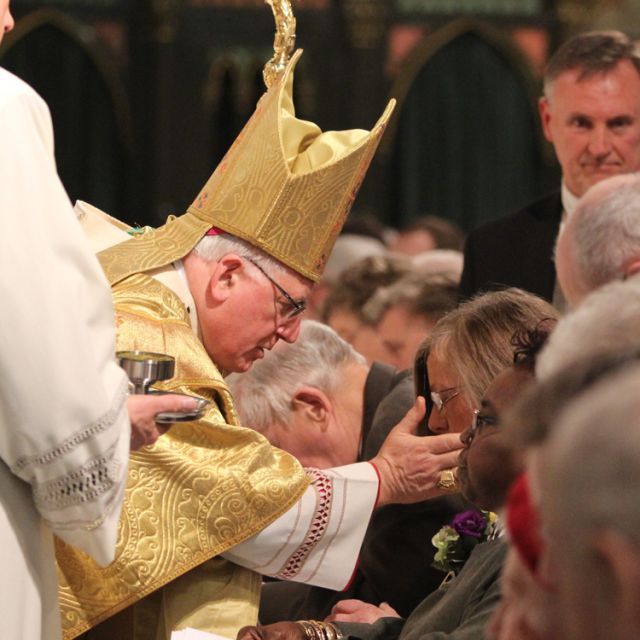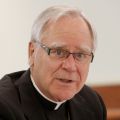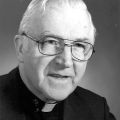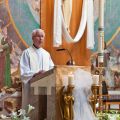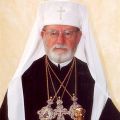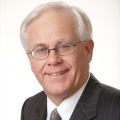OTTAWA - Bishops in Ottawa and Victoria received two groups from the Anglican Catholic Church of Canada (ACCC) into the Roman Catholic Church April 15, including two former ACCC bishops and about a half dozen clergy.
"Today, the Body of Christ is a little more healed, a little more unified," Ottawa Archbishop Terrence Prendergast told more than 700 people who packed St. Patrick's Basilica. "Today, after half a millennium, separated brethren are separated no more. We are brethren, rejoicing at the same banquet table. Hallelujah."
York region charities work together to raise poverty awareness
By Erin Morawetz, The Catholic RegisterRICHMOND HILL, ONT. - Two York Region charities are joining forces to get the word out about an issue they say goes mostly unnoticed — the poverty that exists in this suburban landscape.
The Society of St. Vincent de Paul and the Mosaic Interfaith Out of the Cold have planned a “Walk Against Poverty” May 12 to raise both awareness about poverty in the area and some much-needed funds.
Dawn Hayes is a volunteer with the St. Patrick-Markham conference of the Society of St. Vincent, a charitable Catholic organization that provides financial and emotional support to families in need. Her parish, St. Patrick’s in Markham, provides support to more than 30 families.
Anishinaabe elders adopt Archbishop Weisgerber
By James Buchok, Canadian Catholic NewsWINNIPEG - Anishinaabe elders and community leaders adopted Archbishop James Weisgerber of Winnipeg as their brother April 14 in a traditional ceremony at Thunderbird House in Winnipeg, the first event of its kind in the reconciliation between Indian residential school survivors and missionary churches.
"This is part of a long journey for me," Weisgerber said.
As a priest in Saskatchewan, he had been a pastoral minister at four of what were then called Indian reserves, "but nobody ever talked about the residential schools," he said. In 1990, Phil Fontaine, former National Chief of the Assembly of First Nations, "made a public declaration and released a huge barrage, and more people began speaking and I began to understand," Weisgerber said.
Fr. Crowe’s life dedicated to Lonergan’s philosophy
By Michael Swan, The Catholic RegisterTORONTO - Jesuit Father Fred Crowe’s long, happy and productive life came to a peaceful end Easter Sunday, April 8. He was 96 years old and had spent 76 years living the vows of a Jesuit.
“The last years of his life he just kept writing,” said Jesuit Father Gordon Rixon. “He was one of those Jesuits who was in the library by 5:30 in the morning.”
For most of the last 60 years, Fr. Crowe was in the library carefully collecting, editing, explaining and interpreting the work of his seminary professor, Fr. Bernard Lonergan. Lonergan was a Canadian Jesuit who became a towering figure in philosophy and theology.
We can all do more, says 50-year Jesuit
By Michael Swan, The Catholic RegisterCONCORD, ONT. - The Jesuits want more — more faith, more work, more justice, more truth, more hope, more for the love of Christ. Celebrating 50 years as a Jesuit, Fr. Bert Foliot preached the Jesuit demands for more prior to the annual Jesuit Provincial's Dinner.
It was one of the last events in a year spent celebrating 400 years of Jesuit ministry in Canada. The April 11 evening was dedicated to the core Jesuit value of more — which in the traditional language of St. Ignatius of Loyola Jesuits call "the magis."
Archbishop Bzdel was metropolitan for Ukrainian Catholics in Canada
By Catholic News ServiceWINNIPEG, Manitoba - Archbishop Michael Bzdel, who served as metropolitan for Ukrainian Catholics in Canada for nearly 13 years, died April 3 at his home in Winnipeg. He was 81.
He became metropolitan after his ordination as archbishop March 9, 1993. He served in the position until his retirement in January 2006.
Born to Ukrainian immigrants in Wishart, Saskatchewan, July 21, 1930, Archbishop Bzdel was the 11 of 14 children in his family.
This year’s ShareLife contributions are on the rise - up by $160,000
By Evan Boudreau, The Catholic RegisterTORONTO - Things are looking optimistic for the 2012 ShareLife parish campaign as contributions are up compared to last year after the first ShareLife Sunday on March 29.
“The initial results are in and they’re slightly ahead of last year which is optimistic,” said Arthur Peters, ShareLife’s executive director.
Before noon on April 5 the campaign total sat at $4,316,550, about a $160,000 increase from the previous year. Money collected supports more than 40 social agencies which benefit 250,000- plus people in need.
Clergy seek higher taxes — for themselves
By Michael Swan, The Catholic RegisterThe clergy have never been an outstanding revenue source for governments, yet some clergy are volunteering to pay more taxes.
Rabbi Stephen Wise of Shaarei-Beth El Congregation in Oakville, Ont., is forming Faith Leaders for Fair Taxation. Modeled after Doctors for Fair Taxation and Lawyers for Fair Taxation, Wise wants to provide a platform for all clergy to ask governments to increase taxes.
People have to stop thinking of taxes as a dirty word, said Wise.
Religious freedom office ambassador coming soon
By Deborah Gyapong, Canadian Catholic NewsOTTAWA - Foreign Affairs Parliamentary Secretary Bob Dechert expects the Canadian government will soon name an ambassador to head the Office of Religious Freedom.
Dechert, who has been overseeing consultations for the new office that have been taking place across Canada, told the Second Parliamentary Forum on Religious Freedom and Governance April 2 the Canadian government is committed to making religious freedom a pillar of foreign policy. He did not announce a date for the office’s establishment, but said it will have an initial budget of $5 million.
Holy Week fast for D&P
By Michael Swan, The Catholic RegisterA week without solid food isn’t going to fill the $5-million hole in the Canadian Catholic Organization for Development and Peace’s budget, but Kaitlyn Duthie-Kannikkatt felt she had to take on a Holy Week fast to protest CIDA cuts to the Catholic movement.
The 22-year-old Carleton University student lived on nothing but tea, water and juice until Easter Sunday even while working on her graduating thesis in the global politics program. By mid-week her protest had raised almost $1,400 for D&P.
“The fact that these cuts took place, or we heard tell of them, during Lent is really telling,” Kannikkatt told The Catholic Register. “Being that time of year, it provided an opportunity for the (D&P) membership across the country to get in touch with this issue in a more spiritual and connected way.”
On Good Friday, Kannikkatt was joined on her fast by almost 300 people who vowed to dedicate their fast to D&P. They will give money they would otherwise have spent on food to the Canadian bishops’ development agency while also writing letters to the government to protest a 65-per-cent cut in CIDA funding for 2011 to 2016.
The member actions have inspired the agency’s 60-plus employees, said D&P program co-ordinator Siobhan Rowan.
“It’s been quite incredible and very heartening,” Rowan said. “And it makes it all the harder to think of what we’re going to lose.”
Kannikkatt has written letters to Prime Minister Stephen Harper and International Co-operation Minister Bev Oda asking for reasons behind the funding cut, but has yet to receive a reply.
“Fasting throughout the centuries has been used as a really powerful means of resistance,” said Kannikkatt.
Citing Indian leader Mohandas Gandhi, Kannikkatt doesn’t believe fasting can be easily classified as either political or spiritual.
“Hundreds of members across the country are going to be joining me in this fast,” she said.
“Fasting together, in solidarity with each other, I think that is an incredible example of the Spirit moving through the people involved in this organization as well as making a powerful statement about the politics behind it.”
Kannikkatt’s final paper is about how a corporate social responsibility program run by a Canadian mining company in Guatemala is affecting development prospects for the local community. After graduation she is travelling with a D&P delegation to the Rio+20 United Nations conference in June.
The idea that the current government is more interested in charity than justice, more interested in corporate image repair than democratic change has the employees of D&P calling for action to confront the Conservatives on their development policy, said Rowan.
There’s no way of knowing precisely how many people working with HIV-positive slum dwellers in Africa or helping poor farmers in Haiti are about to lose their jobs because D&P funding has dried up, said Rowan. In many cases laying off the workers in partner organizations will dismantle years of patient, slow work and throw skilled people on the street in countries with no social safety net, she said.
In Ottawa, Kannikkatt isn’t complaining about hunger pangs. She’s thinking about the future of the movement.
“It means we’re going to have to start seeing how we can work differently with our allied organizations in the ecumenical world and in the secular world — see how we can combine our efforts a little bit more,” she said.
“Also we have to see how we can speak out with a more collective voice against this trend in the government away from good, solid, trusted development work that organizations like Development and Peace do to something much more problematic.”
Government shuts down Rights & Democracy
By Deborah Gyapong, Canadian Catholic NewsOTTAWA - The Conservative government’s elimination of the International Centre for Human Rights and Democratic Development has put an underlying ideological debate about human rights into the spotlight.
Created in 1988, the agency known as Rights and Democracy has been embroiled in controversy described in the news media largely as a conflict between human rights advocates on the staff and Conservative appointees on the Montreal-based agency’s board.
Foreign Affairs Minister John Baird cited “challenges” within the organization as the reason why he decided to close it.

